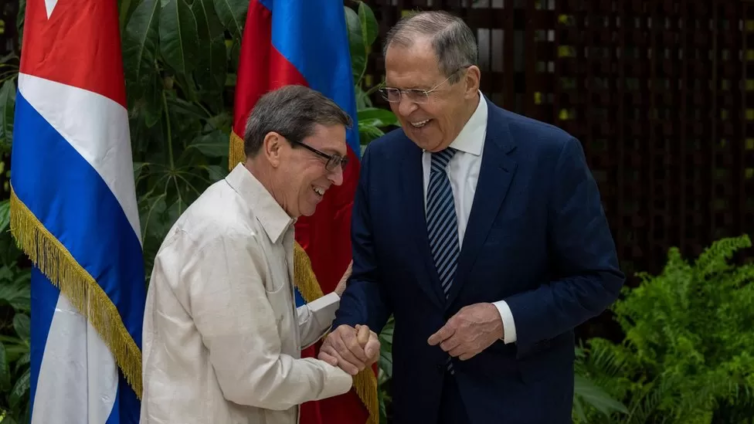The Cuban foreign ministry says it has uncovered a human trafficking ring aimed at recruiting Cubans to fight for Russia in its war in Ukraine.
It said that Cubans living in Russia and "even some in Cuba" had been "incorporated into the military forces taking part in the war in Ukraine".
Cuba is a close ally of Russia, but it stressed in its statement "it does not form part of the conflict in Ukraine".
There has not yet been a response from Russia.
The Cuban foreign ministry did not specify who was behind the operation.
Last August, President Vladimir Putin ordered the Russian military to increase its number of soldiers after its combat forces suffered heavy losses in Ukraine.
A Russian newspaper, Ryazan Gazette, has since reported that Cubans living in Russia had joined Russian combat forces fighting in Ukraine in exchange for a promise to receive Russian citizenship.
While it is not clear if the Cuban foreign ministry statement is linked to the reports in Ryazan Gazette, it states that "Cuba has a firm and clear historical position against the use of mercenaries".
"We will act decisively against those who... engage in human trafficking with the aim of recruiting Cuban citizens to bear arms in any country," the statement reads.
Cuban Foreign Minister Bruno Rodríguez published the statement on X, formerly known as Twitter, adding that Cuba was using "the force of the law" to counter attempts to recruit its citizens.
The statement strikes a rare dissonant note in recent Cuban-Russian relations, which has seen the two countries forging tighter trade ties.
Just over two months ago, the defence ministers of Cuba and Russia held talks in Moscow, and the Russian foreign minister travelled to the Communist-run island in April as part of a tour of Russia's Latin American allies.
Cuba has been a close ally of Russia since the Cuban revolution, which saw Fidel Castro seize power in 1959.
Castro - whom the United States tried and failed to overthrow on numerous occasions - sided with Russia in the Cold War. Moscow in turn provided the government in Havana with economic, political and military assistance.
A secret deal in 1962 allowing the Soviet Union to station nuclear missiles in Cuba to deter fresh US attempts to invade the island triggered one of the Cold War's most dangerous confrontations between the US and the Soviet Union.
While the Cuban missile crisis came to an end peacefully after Soviet leader Nikita Khrushchev and US President John F. Kennedy reached an agreement, Cuba's relations with the US have remain tense, not least due to the decades-long sanctions the US has imposed on Cuba.
Latest Stories
-
‘Let industry players play the game ‘ – AOMC boss slams political interference in oil sector
8 mins -
‘So many regulations, yet corruption prevails’ – Dr Riverson Oppong on OMC oversaturation
17 mins -
At least 24 dead after two boats capsize off coast of Madagascar
1 hour -
Madina MP lauds White Chapel Youth Group for championing peace ahead of elections
1 hour -
Man United settle for draw at Ipswich Town in Amorim’s first game in charge
2 hours -
GPL 2024/2025: Prince Owusu screamer earns Medeama win over Young Apsotles
2 hours -
BBC visits mpox clinic as WHO says DR Congo cases ‘plateauing’
2 hours -
Burning old TVs to survive in Ghana: The toxic trade in e-waste
2 hours -
Perfume boss admitted he ignored Russia sanctions
2 hours -
Wicked proves popular as opening set to be biggest for Broadway film
3 hours -
Nominee for agriculture secretary completes Trump cabinet
3 hours -
ECG urges prepaid customers to top up to last one month ahead of system upgrade
3 hours -
Three more tourists named in Laos methanol deaths
3 hours -
Betway Africa offers a once-in-a-lifetime ‘Play-on-the-Pitch’ experience at Emirates Stadium
4 hours -
The rise and fall of Matt Gaetz in 8 wild days
4 hours

